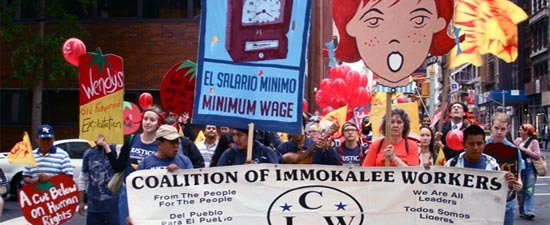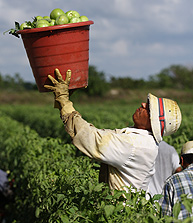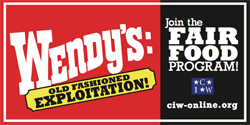“The Final Fast Food Hold-out”

Of the five largest fast food corporations in the country — McDonald’s, Subway, Burger King, Taco Bell (Yum! Brands), and Wendy’s — Wendy’s stands alone as the only one who has refused to join the Fair Food Program and respect the rights and dignity of farmworkers in its supply chain.
As Wendy’s positions itself to implement sustainable business practices and promote its sourcing of “honest ingredients,” it must realize that respect for human rights and worker participation are integral components of the genuine sustainability that today’s consumers expect and demand.
Click here to download the Campaign Background One-Pager!
READY TO TAKE ACTION?
From home:
![]() Visit Sum of Us for the phone number, instructions and talking points with which make your own call to tell Wendy’s to join the Fair Food Program.
Visit Sum of Us for the phone number, instructions and talking points with which make your own call to tell Wendy’s to join the Fair Food Program.
![]() Sign the petition to tell Wendy’s to sign the Fair Food Agreement and get on the right side of history!
Sign the petition to tell Wendy’s to sign the Fair Food Agreement and get on the right side of history!
At your local Wendy’s:
![]() Download, print and take this letter to the Wendy’s restaurant near you! Drop it off with the store manager to let Wendy’s know that people across the country want them to get on board with the Fair Food Program.
Download, print and take this letter to the Wendy’s restaurant near you! Drop it off with the store manager to let Wendy’s know that people across the country want them to get on board with the Fair Food Program.
![]() Ready to help get the word out to others? Download this flyer for when you are participating in an action, would like materials to hand out at an event you’re attending or simply want to educate your friends and family! It has all the basics.
Ready to help get the word out to others? Download this flyer for when you are participating in an action, would like materials to hand out at an event you’re attending or simply want to educate your friends and family! It has all the basics.
![]() Are you hosting a picket, march or other action in your community? Download a PDF of either of these beautiful banners and send it to your local print shop for a colorful addition to your homemade campaign art!
Are you hosting a picket, march or other action in your community? Download a PDF of either of these beautiful banners and send it to your local print shop for a colorful addition to your homemade campaign art!
Get in touch!
Is there a Fair Food group or a local organizer already in your community? Use this handy map to find out—just click on your state to view names, contact information and get involved today! Interested in being a local contact? Let us know!
Wendy’s twisted truths
Most recently, Wendy’s unveiled their full PR response to the CIW on their website, titled “A Conversation About Florida Tomatoes.” Rife with convoluted and misleading statements, here is a sample:
“A CONVERSATION ABOUT FLORIDA TOMATOES
Wendy’s is being targeted by an activist group called the Coalition of Immokalee Workers (CIW) and its allies at other activist organizations.
CIW demands we make payments to employees of the companies who supply our tomatoes from the Immokalee area in Florida — even though they are not Wendy’s employees. CIW is demanding an added fee on top of the price we pay our suppliers. However, because of our high standards, we already pay a premium to our Florida tomato suppliers.
We believe it’s inappropriate to demand that one company pay another company’s employees. America doesn’t work that way.
Our responsibility to Wendy’s customers is to negotiate directly with our suppliers – not third-party organizations — to ensure our product specifications are met at a competitive price. If our suppliers incur additional labor costs, we would expect them to pass them on to us over time.
Actions by Our Florida Tomato Suppliers
All of the Florida tomatoes purchased by Wendy’s supply chain cooperative come from suppliers who participate in the Fair Food Program, which means they have:
1. Adopted the Fair Food Code of Conduct
2. Agreed to implement a system of health and safety volunteers, which affords workers regular and structured input into the safety of their work environment
3. Agreed to an independent and verifiable complaint investigation and remediation mechanism
4. Agreed to have compliance with the program independently monitored
5. Agreed to a worker education program conducted on company premises and company timeWendy’s supports ongoing efforts by Florida tomato growers to improve working conditions for their workers.” see the response in its natural habitat here
“We’re already participating…”
- Wendy’s, like Publix before it, says, “CIW demands we make payments to employees of the companies who supply our tomatoes from the Immokalee area in Florida…”
Fact: No, we don’t. The Fair Food Program, which the CIW is calling on Wendy’s to join, requires participating buyers to pay a Fair Food Premium for purchases of Florida tomatoes. That premium, similar to any fair trade premium, is not paid by the buyer directly to the workers, but is in fact built into the final price of tomatoes, on the invoice, paid to participating growers. The buyers simply pay for their tomatoes as they always have, only now with a small premium. The accounting and
 distribution of the penny-per-pound funds are handled by the growers, who pay workers in the form of a bonus on their regular paycheck. Wendy’s would not make any payments to any employees of other companies.
distribution of the penny-per-pound funds are handled by the growers, who pay workers in the form of a bonus on their regular paycheck. Wendy’s would not make any payments to any employees of other companies. - Wendy’s says, “However, because of our high standards, we already pay a premium to our Florida tomato suppliers.”
Fact: Whatever premium Wendy’s claims it is paying here, it is most definitely not the Fair Food Premium, it is not being monitored by the accounting systems of the Fair Food Program, and it is not going to address the grinding poverty suffered by the workers who have picked Wendy’s tomatoes for decades. As such, to include whatever premium Wendy’s might be paying in a “conversation” about the Fair Food Program is, at best, confusing, and at worst, deceptive. We invite you to decide which of those might best describe Wendy’s intent here.
- Wendy’s says, “All of the Florida tomatoes purchased by Wendy’s supply chain cooperative come from suppliers who participate in the Fair Food Program.”
Fact: How convenient. Only Wendy’s knows if that particular claim is true, and that’s exactly the problem. Transparency is a cornerstone of the Fair Food Program, and all participating buyers report their Florida tomato purchases to the Fair Food Standards Council. This mapping allows for the accurate accounting of the Fair Food Premium and for the effective exercise of the market-based enforcement mechanisms behind the Fair Food Code of Conduct. When a participating grower is found to be in violation of the zero tolerance provisions of the Code, or refuses to correct other violations discovered through regular audits or the complaint resolution mechanism, that grower is suspended from the Program. The participating buyers that purchase from that grower are informed so that they can shift their purchases to other participating growers in good standing, as they committed to do upon joining the Program. Wendy’s claim to purchase all of its tomatoes from participating growers rings hollow both because it is utterly unverifiable and because it is meaningless, even if true, as in the event that one of its suppliers is suspended from the Program, Wendy’s is under no obligation to shift its purchases.
What’s American?
The logic — if that word can be used — behind the statement as a whole is so convoluted as to be almost incomprehensible. But the twist that truly sets the Wendy’s statement apart is found in this stand-alone paragraph:
“We believe it’s inappropriate to demand that one company pay another company’s employees. America doesn’t work that way.”
First of all, the Fair Food Program doesn’t work that way, either. For our answer to the explicit premise of this particular passage — that the CIW is calling on Wendy’s to pay another company’s employees — see response #1 above. Wendy’s can have its own opinions, but it can’t have its own facts.
But, as to its implicit premise — that the Fair Food Program itself is somehow un-American — well, that is a matter of opinion, and on that we are simply going to have to agree to disagree (once we ultimately sit down to hammer out a Fair Food agreement, that is).
We would submit that there is nothing more “American” than social reform. Yes, slavery was American, but the Abolitionist movement ultimately proved to be more in keeping with the fundamental promises on which this country was founded than did that brutal institution of exploitation. Yes, the subjugation of women was American, but the Suffragist movement ultimately proved more American. And yes, the systematic legal and economic oppression of African Americans was American, and staunchly defended by some of this country’s greatest and most respected minds, but ultimately the Civil Rights movement proved far, far more American.
And yes, for generations, the systematic exploitation and degradation of the men and women who toil in our fields was every bit as American as all those other social ills. But, ultimately, we are quite certain that the Fair Food movement — including its premium, designed to redress decades of farmworker poverty created, in significant part, by the volume purchasing power of multi-billion dollar buyers like Wendy’s — will prove more American.
Perhaps most importantly, we are quite sure that Wendy’s customers—particularly the “milennials” with whom Wendy’s so desperately wants to build an emotional connection—will agree.


